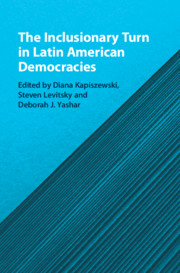Book contents
- The Inclusionary Turn in Latin American Democracies
- The Inclusionary Turn in Latin American Democracies
- Copyright page
- Contents
- Figures
- Tables
- Contributors
- Acknowledgments
- Prologue: Reflections on Two Episodes of Popular Inclusion
- 1 Inequality, Democracy, and the Inclusionary Turn in Latin America
- Part I Extending Social Policy and Participation
- 2 Including Outsiders in Latin America
- 3 Diffusion Dynamics
- 4 Inclusion Without Power?
- 5 Brazil’s Participatory Infrastructure
- Part II Inclusion and Partisan Representation
- Part III New Party–Society Linkages
- Part IV Inclusion, Populism, and Democracy
- References
5 - Brazil’s Participatory Infrastructure
Opportunities and Limitations for Inclusion
from Part I - Extending Social Policy and Participation
Published online by Cambridge University Press: 12 January 2021
- The Inclusionary Turn in Latin American Democracies
- The Inclusionary Turn in Latin American Democracies
- Copyright page
- Contents
- Figures
- Tables
- Contributors
- Acknowledgments
- Prologue: Reflections on Two Episodes of Popular Inclusion
- 1 Inequality, Democracy, and the Inclusionary Turn in Latin America
- Part I Extending Social Policy and Participation
- 2 Including Outsiders in Latin America
- 3 Diffusion Dynamics
- 4 Inclusion Without Power?
- 5 Brazil’s Participatory Infrastructure
- Part II Inclusion and Partisan Representation
- Part III New Party–Society Linkages
- Part IV Inclusion, Populism, and Democracy
- References
Summary
This chapter sets out a roadmap to understand the new politics of participation in Latin America by exploring the intersection between two important transformations in society and the state. First, we highlight new actors in state and society who are pressing for policy reform. Whereas the existing literature focuses on interests organized around social class and indigenous identity, we reveal a rainbow of societal actors that span class lines, as well as the emergence of activist bureaucrats, who work together to demand greater social inclusion and policy change. Second, while prior studies emphasize representative institutions as the main site to advance policy change, we analyze the importance of new institutions for participation in the executive and the judicial branches of government. These sites have been central for activism in a range of underexplored policy areas, including the environment; the rights of women, people with disabilities, and sexual minorities; and crime. Together, we argue, these new actors and institutions are redefining the politics of participation today in Latin America.
Keywords
- Type
- Chapter
- Information
- The Inclusionary Turn in Latin American Democracies , pp. 155 - 182Publisher: Cambridge University PressPrint publication year: 2021
References
- 2
- Cited by

